- Home
- Peter Straub
A Dark Matter: A Novel
A Dark Matter: A Novel Read online
also by peter straub
NOVELS
In the Night Room
lost boy lost girl
Black House (with Stephen King)
Mr. X
The Hellfire Club
The Throat
Mrs. God
Mystery
Koko
The Talisman (with Stephen King)
Floating Dragon
Shadowland
Ghost Story
If You Could See Me Now
Julia
Under Venus
Marriages
POETRY
Open Air
Leeson Park & Belsize Square
COLLECTIONS
Wild Animals
Houses Without Doors
Magic Terror
Peter Straub’s Ghosts (editor)
Conjunctions 39: The New Wave Fabulists (editor)
Sides
Poe’s Children (editor)
5 Stories
The American Fantastic Tale (editor)
For Judy and Ben Sidran
Contents
Cover
Other Books by this Author
Title Page
Dedication
Part 1 - At First
Chapter 1 - A Few Years Back, Late Spring
Part 2 - Hootie’s Blues
Chapter 2
Part 3 - Donald Olson
Chapter 3 - Chicago, Early Summer
Chapter 4 - Madison and Milwaukee
Part 4 - Meredith Bright Walsh
Chapter 5
Part 5 - The Dark Matter
Chapter 6
Chapter 7
Part 6 - The Phenomenon of Flight
Chapter 8 - A Week Later
Chapter 9
Acknowledgments
About the Author
Copyright
Is there an emptiness we all share?
Before the end, I mean?
Heaven and earth depend on this clarity,
Heaven and earth.
Under the gold doubloons of the fallen maple leaves,
The underworld burrows in,
Sick to death of the light.
—CHARLES WRIGHT, Littlefoot
at first
A Few Years Back, Late Spring
The great revelations of my adult life began with the shouts of a lost soul in my neighborhood breakfast joint.
I was standing in line at the Corner Bakery on State and Cedar, half a block down the street from my pretty brick townhouse, waiting to order a Swiss Oatmeal (muesli) or a Berry Parfait (granola), anyhow something modest. The loudest noises in the place were the tapping of laptop keys and the rustle of someone turning newspaper pages. Abruptly, with a manic indignation that seemed to come from nowhere, the man at the head of the line started uttering the word obstreperous. He started out at a level just above ordinary conversation. By the time he found his rhythm, he was about twice that volume and getting louder as he rolled along. If you had to settle on one word to yell over and over in public, wouldn’t you pick something less cumbersome? Yet he kept at it, spinning those four lumpy syllables every possible way, as if trying them on for size. His motive, for nothing actually comes from nowhere, soon became obvious.
Obstreperous? ObSTREPerous? OBSTREPEROUS? Ob-strep?-ERous? OBstreperous?
Lady, you think I’m obstreperous now? This is what he was saying. Give me another thirty seconds, you’ll learn all about obstreperous.
With each repetition, his question grew more heated. The momentarily dumbfounded young woman at the order counter had offended him, he wished her to know how greatly. The guy also thought he was making himself look smart, even witty, but to everyone else in the shop he had uncorked raving lunacy.
His variations were becoming more imaginative.
Obstreeperous? Obstraperous? ObstrapOROUS?
To inspect this dude, I tilted sideways and looked down the good-sized line. I almost wished I hadn’t.
Right away, it was obvious that the guy was not simply playing around. The next man in line was giving him six feet of empty floor space. Under the best of circumstances, people were going to keep their distance from this character. Eight or nine inches of white-gray hair surged out in stiff waves around his head. He was wearing a torn, slept-in checked suit that might have been ripped off a cornfield scarecrow. Through a latticework of scabs, smears, and bruises, his swollen feet shone a glaring, bloodless white. Like me, he had papers under his elbow, but the wad of newsprint he was clamping to his side appeared to have lasted him at least four or five days. The puffed-up bare feet, scuffed and abraded like shoes, were the worst part.
“Sir?” said the woman at the order counter. “Sir, you need to leave my store. Step away from the counter, sir, please. You need to step away.”
Two huge kids in Southern Illinois sweatshirts, recent graduates by the look of them, jammed their chairs back and marched straight toward the action. This is Chicago, after all, where big, athletic-looking dudes sprout out of the sidewalks like dandelions on a suburban lawn. Without speaking to anyone, they came up on the homeless guy’s flanks, hoisted him by his elbows, and transported him outside. If he had gone limp, they would have had a little trouble, but he was rigid with panic and gave them no more difficulty than would a cigar store Indian. He went stiff as a marble statue. When he went by, I took in his blubbery lips and brown, broken teeth. His bloodshot eyes had a glazed look. The man kept saying, obstreperous obstreperous obstreperous, but the word had become meaningless to him. He was using it for protection, like a totem, and he thought as long as he kept saying it, he was out of danger.
When I looked into those flat, unseeing eyes, an utterly unforeseen thought jolted me. The impact felt like a blow, and brought with it a cryptic sense of illumination as brief as the flaring of a match.
I knew someone like that. This terrified man with a one-word vocabulary reminded me so vividly of someone that he might have been that person, now in the act of being ejected onto Rush Street. But … who in the world could it have been? No one I knew was anything like the damaged character now staggering forward and back on the sidewalk beyond the great windows, still whispering his totemic word.
A voice only I could hear said, No one? Think again, Lee. Deep in my chest, something big and decisive—something I had been ignoring and thrusting out of view literally for decades—stirred in its sleep and twitched its leathery wings. Whatever had nearly awakened tasted, in part, like shame, but shame was by no means all of it.
Although my first response was to turn away from whatever was causing my internal tumult (and turn away I did, with as much of my native resolve as I could summon), the memory of having witnessed an inexplicable illumination clung to me like a cat that had jumped onto my back and stuck its claws into my skin.
The next thing I did involved a typical bit of unconscious misdirection—I tried to believe that my distress was caused by the register girl’s stupid language. Maybe that sounds snobbish, and maybe it is snobbish, but I’ve written eight novels, and I pay attention to the way people use words. Maybe too much attention. So when I finally stood in front of the young woman who had told that ruined creature that he “needed” to leave her “store,” I expressed my unhappiness by ordering an Anaheim Scrambler, which comes with smoked bacon, cheddar cheese, avocado, and a lot of other stuff including hash browns, and a corn muffin, too. (Alas, I am one of those people who tend to use food as a way of dodging unwelcome emotions.) Anyhow, when did people start framing commands in terms of neediness? And how long had people in the restaurant business been calling their establishments “stores”? Couldn’t people see the ugliness and inaccuracy of this crap? The creature within me rolled back into its uneasy
sleep, temporarily lulled.
I parked myself at an empty table, snapped open my paper—the Guardian Review—and avoided looking at the big front windows until I heard one of the staff bringing my tray to me. For some reason, I turned around and glanced through the window, but of course that wretched, half-sane character had fled. Why did I care what had happened to him, anyhow? I didn’t, apart from feeling a sort of generic pity for his suffering. And that poor devil did not remind me of anyone I knew or had once known. For a couple of seconds, a kind of misguided déjà vu had come into play. Nobody thought of déjà vu as anything except a momentary delusion. It gave you an odd buzz of recognition that felt like occult knowledge, but the buzz was psychic flotsam, of no value whatsoever.
Forty-five minutes later, I was walking back to my house, hoping that the day’s work would go well. The minor disturbance in the Corner Bakery hardly counted even as a memory anymore, except for the moment when I was sliding my key into the front-door lock and saw once again his glassy, bloodshot eyes and heard him whispering obstreperous obstreperous. “I need you to stop doing that,” I said out loud, and tried to smile as I stepped into my bright, comfortable foyer. Then I said, “No, I do not know anyone even faintly like you.” For half a second, I thought someone was going to ask me what I was talking about, but my wife was on an extended visit to Washington, D.C., and in the whole of my splendid house, not a single living thing could hear me.
Work, unfortunately, was of no use at all. I had been planning to use the days my wife was gone to get a jump-start on a new novel then known as Her Level Gaze. Never mind the total lameness of the title, which I intended to change as soon as I came up with a better one. Atop my oversized desk, a folder bulging with notes, outlines, and ideas for chapters sat beside my iMac, and a much smaller folder beside it held the ten awkward pages I had managed so far to excrete. Once I started poking it, the novel that had seemed so promising when still a shimmer of possibility had turned into a slow-moving, snarling animal. The male protagonist seemed to be a bit slow-moving, too. Although I did not want to admit it, the main character, the young woman with the disconcertingly level gaze, would have eaten him for breakfast in a single bite.
At the back of my mind was a matter I did not actually want to think about that day, a far too tempting suggestion made some years ago, God, maybe as many as five, by David Garson, my agent, who told me that my publisher had, who knows how seriously, proposed to him over lunch that at least once I should write a nonfiction book, not merely a memoir, but a book about something.
“Lee,” David said, “don’t get paranoid on me, he wasn’t saying he wanted you to stop writing novels, of course he wasn’t. They think you have an interesting way of seeing things, that’s their main point here, and they think it might be useful if just once, and I mean just once, Lee Harwell could turn this reader-friendly yet challenging trait of his onto some event in the real world. The event could be huge, or it might be something smaller and more personal. He added that he thought a book like that would probably do you some good in the marketplace. He has a point there, actually. I mean, I think it’s an extraordinarily interesting idea. Do you want to consider it? Why don’t you just mull it over for a couple of days, see what occurs to you? I mean, just as a suggestion.”
“David,” I said, “no matter what my intentions are, everything I write winds up turning into fiction, including my letters to friends.” Yet David is a good guy, and he does look out for me. I promised to think about it, which was disingenuous of me because in fact I already had been turning over the possibility of doing a nonfiction book. An unpublished and unpublishable manuscript I had come across on eBay a couple of months earlier, a kind of memoir by a Milwaukee homicide detective named George Cooper, seemed to crack open an old, officially unsolved series of murders that had much interested my friends and me when we were in grade school and high school. Of even greater interest to me right now was that these “Ladykiller” homicides appeared to have an at least tangential connection to a dark matter that involved these friends of mine, including the amazing girl who became my wife, though not me, in our last year in high school. But of that I did not wish to think—it involved a young man named Keith Hayward who had been, it seemed, a sick, evil child tutored in his sickness and evil by a truly demonic figure, his uncle. All of that was in the sort-of memoir Detective Cooper had written out in his cursive, old-school hand, and even as I put the story together I was determined to resist the gravitational pull it worked on me. The immense theological question of evil felt too great, too complex to address with the tools and weapons I possessed. What I knew best had only to do with stories and how they proceeded, and a mere instinct for narrative wasn’t enough to take on the depths of the Hayward story. That my wife and our friends had come in contact with creepy Keith Hayward also put me off.
At the usual hour of one-thirty, hunger pulled me into the kitchen, where I put together a salad, warmed up some soup, and made half a sandwich with pumpernickel bread, Black Forest ham, coleslaw, and Russian dressing. Dinah Lion, my assistant, who would otherwise have been present, did not come in on Mondays, so the isolation of morning remained intact. Dinah would be gone for the next ten days or so, also, in an arrangement we had worked out with my accountants that was going to let her join her parents in Tuscany at half pay in exchange for some juggling with the vacation she normally took in August.
For some reason, the second I sat down before my solitary little meal, I felt like weeping. Something vital was slipping away from me, and for once this sense wasn’t just a fantasy about the novel I was writing. The huge wave of sadness building up within me was connected to something more critical than Her Level Gaze; it was something I had lived with for much longer than I had my foundering book. Tears steamed up into my eyes and trembled there. For an excruciating moment, I was in the ridiculous position of grieving for a person, a place, or a condition that remained hidden from me. Someone I loved had died when we were both very young—that’s what it felt like—and I had committed the dim-witted crime of never stopping to mourn that loss until just now. This must have been the source of the shame I tasted before I started ramming scrambled eggs, avocado, and cheddar cheese into my mouth. I had let this person disappear.
At the thought of the breakfast I had forced down my throat in the Corner Bakery, my hunger curdled. The food on the table looked poisoned. Tears slid down my face, and I stood up to turn toward the counter and grab some tissues. After I had wiped my face and blown my nose, I bagged up the half sandwich, covered the salad bowl with clingy film, and slammed the soup bowl into the microwave, where I could be counted on to forget about it until the next time I opened the thing. Then I made an aimless circuit of the kitchen. The book I had begun writing seemed to have locked me out, which I usually take to mean that it’s waiting for some other, younger author to come along and treat it right. It would be at least a day before I could face my desk again, and when I did I would probably have to dream up some other project.
Her Level Gaze had never been right for me, anyway. At heart, it was a tidy little story about a weak man and a woman like a jungle animal, and I had been dressing it up as a kind of postmodern love story. The book really should have been written by Jim Thompson sometime in the mid-fifties.
A grim, heavy tide of grief went through me again, and this time it seemed that I was mourning the death, the real death, of all my childhood and youth. I groaned out loud, baffled by what was happening to me. A treasure house of beauty and vitality, all of this drenched yet hard-edged sense of pleasure, sorrow, and loss, had vanished, been swept away, and I had barely noticed. My parents, my old neighborhood, my aunts and uncles, a whole era seemed to call out for me, or me for it, and in rapid succession, as if in a series of frames, I saw:
the way a snowfall had looked on a December night in 1960, the big flakes tumbling softly as feathers from a measureless black sky;
a lean hound coursing through the deep snow at the bottom
of our sledding hill;
the shredding lacquer on the tops of our sleds, and the chips and dents in the long, cool runners;
a glass of water shining from within on my mother’s best white tablecloth.
Circling half blind with tears around the marble counter in my Chicago kitchen, I saw the stunning, inelegant west side of Madison, Wisconsin, the place where I had grown up and which I had escaped pretty much as soon as I could. My amazing girlfriend, now my wife, Lee Truax, had fled with me—we drove across the country to New York, where I went to NYU and she waited tables and tended bar until she could enroll at NYU, too, and cause a great fuss and commotion wherever she went. What was speaking to me, though, was not our college years and the East Village, but Madison’s west side, so different then and so much the same, the place where Lee Truax and I had met as children and gone to school with all of our troubled, gorgeous friends.
Then I saw them all, our friends, who had needed to be convinced I was not a jerk because my father was a professor at the University instead of being absent or being nothing, really nothing, like theirs. For a moment their faces shone as clearly as the glass of water that had burned itself into my memory atop my mother’s prize white tablecloth … their young faces tilted toward the Eel’s fine-tuned heart-stopping face. Although they called me Twin, meaning hers, I never really looked like that. And in the next moment, before I could fully take them in, a curtain slammed down like a prohibition. Bang! No more of that for you, bud.
“Please,” I said, then “What’s happening to me?” What a baffled moment, filled with what terrible pain—the pain of what I had not done, of what I had lost because I had not done all of that which I had not done. Whatever it was, I had no idea, I knew only that I had not done it.
Then, as if on a giant screen before me, I saw the moving lips, the unshaven face, the torn horrible feet, and I heard the ragged, almost mechanical voice sucking on the four syllables that represented safety to a ragged soul. At that moment, shut out from a realm I long ago had been happy to abandon, I wished I had a totem, to protect me from Madison—the peeling glaze on the Flexible Flyer; the coursing hound; the sound of lockers banging shut in a high-school hallway; the precise way light from the windows in Room 138 fell across the Eel’s face and Dill Olson’s at the beginning of our senior English class, giving them a gorgeous, washed-out glamour.

 Poe's Children: The New Horror: An Anthology
Poe's Children: The New Horror: An Anthology Koko
Koko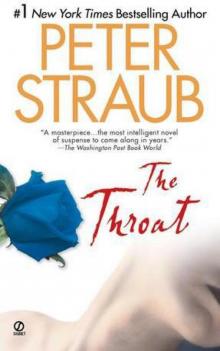 The Throat
The Throat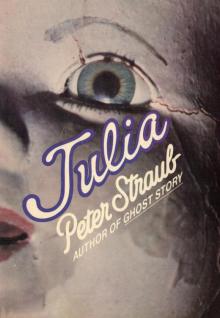 Julia
Julia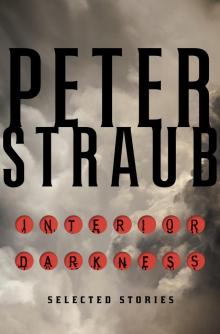 Interior Darkness: Selected Stories
Interior Darkness: Selected Stories A Dark Matter
A Dark Matter Floating Dragon
Floating Dragon Houses Without Doors
Houses Without Doors Mr. X
Mr. X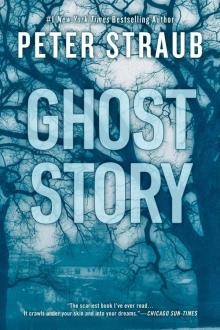 Ghost Story
Ghost Story Mystery
Mystery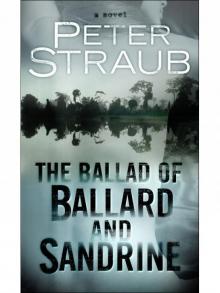 The Ballad of Ballard and Sandrine
The Ballad of Ballard and Sandrine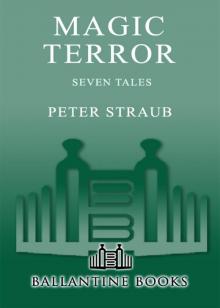 Magic Terror
Magic Terror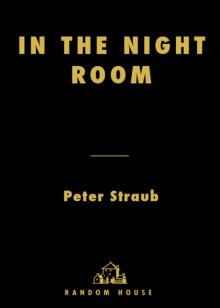 In the Night Room
In the Night Room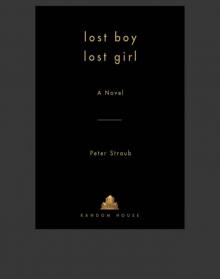 Lost Boy Lost Girl
Lost Boy Lost Girl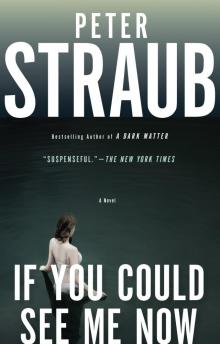 If You Could See Me Now
If You Could See Me Now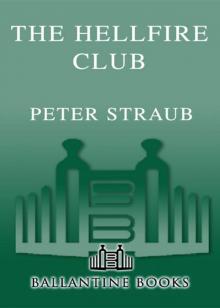 The Hellfire Club
The Hellfire Club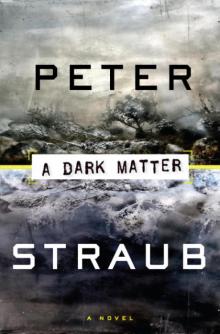 A Dark Matter: A Novel
A Dark Matter: A Novel Koko brt-1
Koko brt-1 Shadowland
Shadowland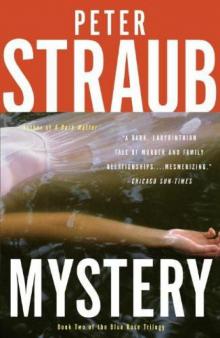 Mystery brt-2
Mystery brt-2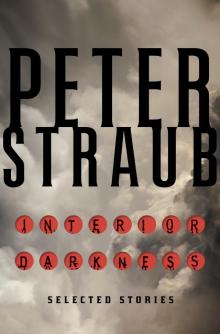 Interior Darkness
Interior Darkness Poe's Children
Poe's Children